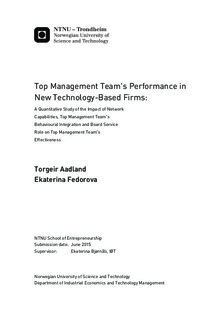Top Management Team's Performance in New Technology-Based Firms: - A Quantitative Study of the Impact of Network Capabilities, Top Management Team's Behavioural Integration and Board Service Role on Top Management Team's Effectiveness
Master thesis
Permanent lenke
http://hdl.handle.net/11250/2352845Utgivelsesdato
2015Metadata
Vis full innførselSamlinger
Sammendrag
In the latter years, the focus on entrepreneurial firms has increased, and as a result, ourunderstanding of these firms has improved significantly. However, in the evolution of modernbusiness, there are still many things to reveal and investigate, for instance the management ofthese firms. This study focuses on the relationship between top management team s (TMT)effectiveness, their network capabilities and behavioural integration, as well as the board ofdirectors service role. We wanted to investigate how the latter three affect the top managementteam s effectiveness. Through a quantitative method, we examined 54 new technology-basedfirms, most of which were academic spin-offs (ASOs), and the rest were non-academic firmswho raised venture capital investment. Companies of this type often lack resources andnetworks, and in order to solve these problems they often acquire new members to the topmanagement team or the board of directors. The board members can contribute by providingresources, sharing networks and contacts, increasing legitimacy, and participate in strategicdecision-makings. On the other hand, as the members of the top management team areresponsible for the daily operations and strategic development, their human impact andcollaboration culture has an essential impact on the firm s success.
Five hypotheses about the connection between network capabilities, top management teambehavioural integration, the board s service role, and top management team s effectivenesswere developed. Following conclusions were drawn from the study: (1) increased networkcapabilities in the top management team increase its effectiveness, (2) increased board s servicerole increase the top management team s effectiveness, (3) the board s service role strengthensthe positive relation between top management team s network capabilities and effectiveness.The study did not support our assumption that increased TMT behavioural integration positivelycorrelates with TMT effectiveness, which was contradictory to our hypothesis. One hypothesiswas inconclusive: we could not claim whether increased TMT behavioural integration wouldpositively affect the relationship between network capabilities and the TMT s effectiveness.
